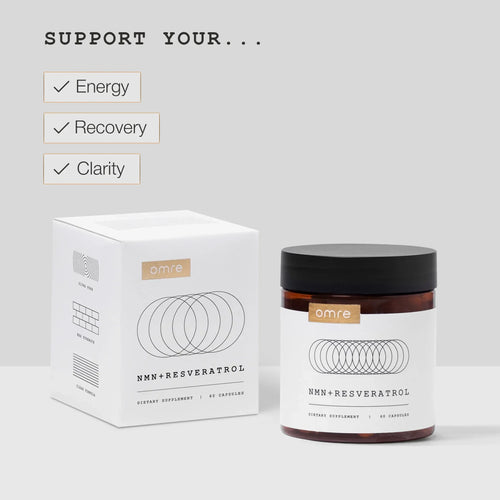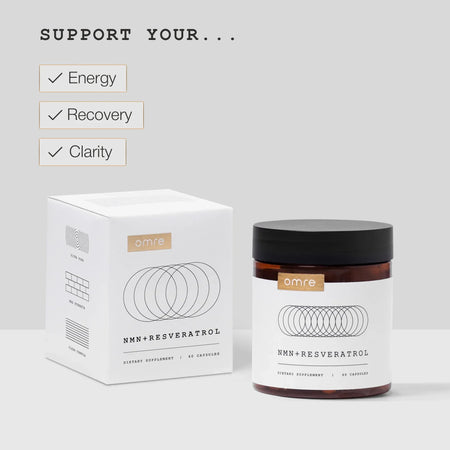Table of Contents
Why do people say that drinking a glass of red wine is good for you? The answer is that grape skins contain Resveratrol, a powerful antioxidant. It may have anti-aging, heart-protective, and cellular health benefits, offering a powerful tool against chronic diseases. Let's delve into the science behind this compound.
NMN + RESVERATROL
Cellular NAD+ booster with ultra‑pure NMN and Resveratrol, at research‑backed doses.*
What Is Resveratrol?
Resveratrol is a polyphenol — a class of plant compounds with antioxidant properties — naturally occurring in grapes, red wine, peanuts, berries, and other foods. This "super-antioxidant" has attracted scientific attention for its anti-aging, anti-inflammatory, and disease-fighting properties.
Resveratrol is known for its potential to boost cellular energy and combat aging processes, with studies suggesting that Resveratrol plays a role in your longevity, cellular health, and overall wellness. [1]
While the foods mentioned above are the most well-known sources of this polyphenol, Resveratrol supplements are an alternative way to obtain concentrated doses without increasing your caloric intake.
Resveratrol Health Benefits
Resveratrol's benefits span a range of vital health areas. Below are some of the most significant:
Improved longevity
Resveratrol activates sirtuins—proteins associated with aging and cellular repair—which could help extend lifespans and improve overall health. By promoting autophagy, the body's process of clearing out damaged cells, Resveratrol may mimic the effects of caloric restriction (aka fasting), a known factor in longevity.
Improved blood flow and lower blood pressure
Studies show that Resveratrol may enhance cardiovascular health by increasing nitric oxide production, which promotes vasodilation and improves blood flow. [2]
Researchers suggest this may help reduce blood pressure, a critical factor in preventing heart disease.
Reduced risk of heart disease
Resveratrol reduces LDL oxidation, a key contributor to atherosclerosis (plaque buildup in the arteries). Simply put, Resveratrol has been shown to reduce the conversion of good and bad fats. Additionally, its anti-inflammatory effects help prevent platelets from sticking to one another, lowering your risk of heart disease.
Potentially impacts cancer cell growth.
Some studies on individual cancer cells in a lab have shown Resveratrol may alter gene expression and metastasis. Scientists have observed this in breast, prostate, colon, and lung cancers. It's important to emphasize that this has not been tested on patients or in proper research studies. [3]
Improved insulin sensitivity
Studies have shown that Resveratrol positively impacts glucose metabolism by activating a key enzyme that helps regulate blood sugar levels and improve insulin sensitivity.
How Resveratrol Works
Resveratrol's health benefits stem primarily from its ability to activate protective genes and proteins, which may slow down or reverse cellular aging pathways. Below are a few ways this powerful compound operates:
To neutralize free radicals
Free radicals are formed all the time as a byproduct of metabolism. Your body naturally produces antioxidants, which neutralize these free radicals, but your body also gains antioxidants from the foods you consume. Resveratrol naturally has incredibly potent antioxidant properties.
To fight inflammation
Resveratrol is also a potent anti-inflammatory agent. It inhibits inflammatory pathways that research has linked to heart disease, arthritis, and neurodegenerative disorders. Low-level chronic inflammation is a major cause of accelerated aging, and Resveratrol shows promise in supporting overall cell health.
Activates longevity proteins
Resveratrol activates proteins called sirtuins, particularly SIRT1, which are involved in longevity and metabolic regulation. This activation promotes autophagy, a cellular cleanup process that removes damaged cells and contributes to extended lifespan. Resveratrol has shown in animal studies that it can promote longevity by mimicking the effects of caloric restriction. Resveratrol may enhance mitochondrial function, a key component in cellular energy production and long-term health.
Cellular NAD+ booster with ultra‑pure NMN and Resveratrol, at research‑backed doses.*NMN + RESVERATROL
Does Resveratrol Help You Lose Weight?
Findings suggest that Resveratrol improves insulin sensitivity and may reduce the conversion of good to bad fats. However, Resveratrol will only function as a weight loss aid by improving diet and exercise.
Resveratrol Effects in Women vs. Men
Resveratrol's estrogen-like properties cause it to affect men and women differently. In women, Resveratrol can enhance cardiovascular protection by complementing estrogen's natural heart health benefits, especially in regulating cholesterol and reducing oxidative stress. However, for women with estrogen-sensitive conditions, like certain breast cancers, Resveratrol may interfere with hormonal balance, potentially worsening these conditions.
Given these gender differences, Resveratrol supplementation should be tailored to your individual health needs, with particular attention to hormonal balance in women and dosage considerations for both sexes.
Potential Side Effects of Resveratrol
While Resveratrol is generally well-tolerated, some people may experience side effects, including nausea, stomach upset, and, in rare cases, headaches. High doses can interact with medications, such as blood thinners, increasing the risk of bleeding. Consult a healthcare professional before starting Resveratrol supplements, particularly if you're on medication or have pre-existing conditions.
Recommended Dosage
The ideal dosage of Resveratrol varies depending on the health benefits you're targeting. Most research studies use a dose of around 100 to 500 mg for anti-aging and metabolic benefits. Some studies have explored higher doses above 1,000 mg, and side effects are naturally more common in these groups. [4]
Some well-known anti-aging experts, such as Dr. David Sinclair, openly share that they take 1,000 mg per day. However, to avoid unwanted side effects, it's best to start with a low dose and increase gradually under the guidance of a healthcare professional.
Resveratrol Benefits - Conclusion
That brings us to the end of our deep dive into the potential benefits of Resveratrol. It's important to highlight that although there are many different reported benefits, most studies are small in scale and have been conducted in animals. This can't be directly correlated with human benefits, and more research needs to be done.
Nevertheless, longevity experts back Resveratrol as a beneficial natural compound for human health based on promising preliminary studies.
Frequently Asked Questions
What medications should not be taken with Resveratrol?
Certain medications might interact with Resveratrol, including blood thinners, blood pressure drugs, cancer treatments, MAOI antidepressants (Monoamine Oxidase Inhibitors), antiviral and antifungal medicines, NSAIDs (Non-Steroidal Anti-Inflammatory Drugs), and supplements like St. John's Wort, garlic, and ginkgo.
You should always consult your healthcare professional before starting any supplement, especially if you are taking any regular medications or have underlying health concerns.
What food is highest in Resveratrol?
Resveratrol is highest in dark chocolate, red grapes, peanuts, and blueberries. Apart from providing benefits like heart health and anti-aging, these foods are high in Resveratrol and an excellent source of essential vitamins and minerals.
What is the benefit of taking Resveratrol?
Resveratrol has multiple potential health benefits, including cardiovascular, anti-aging, cognitive function, metabolic, and joint health. Studies show it protects against blood vessel damage, lowers cholesterol levels, and can reduce platelet stickiness.
When should I take Resveratrol, morning or night?
Longevity experts often recommend taking Resveratrol in the morning. This is because there is a natural rise in Sirtuin activity and NAD+ production in the mornings. The theory is that taking Resveratrol alongside your natural cellular rhythms may augment its benefits.
It has not been tested in research studies, and the recommendation is based on expert opinion.





